
FORMAL METHODS IN SYSTEM DESIGN
Scope & Guideline
Elevating the standards of computational excellence.
Introduction
Aims and Scopes
- Formal Verification Techniques:
The journal emphasizes various formal verification methods, including model checking, theorem proving, and runtime verification, that are essential for ensuring the correctness of systems. - Systems Design and Analysis:
It covers methodologies for the design and analysis of both hardware and software systems, focusing on the integration of formal methods in system engineering processes. - Concurrency and Distributed Systems:
Research on the verification of concurrent and distributed systems is a significant area, addressing challenges like race conditions, deadlocks, and synchronization. - Automated Synthesis and Analysis:
The journal publishes work on automated methods for synthesizing systems and analyzing their properties, including the generation of correct-by-construction systems. - Applications of Formal Methods:
There is a strong focus on practical applications of formal methods in various domains, including safety-critical systems, embedded systems, and real-time systems.
Trending and Emerging
- Integration of Machine Learning and AI:
Recent papers highlight the intersection of formal methods with machine learning, particularly in automating verification processes and enhancing system robustness. - Real-Time and Embedded Systems Verification:
There is a growing emphasis on the verification of real-time systems, driven by the increasing demand for reliable embedded systems in critical applications such as automotive and aerospace. - Probabilistic and Stochastic Systems:
An increased focus on probabilistic model checking and the analysis of stochastic systems indicates a trend towards handling uncertainty in system behavior. - Security and Privacy in Formal Methods:
Emerging research themes include the application of formal methods to security and privacy concerns, highlighting the importance of verifying secure system designs. - Verification of Neural Networks and AI Systems:
The journal is seeing a rise in publications addressing the verification of neural networks, reflecting growing interest in ensuring the reliability of AI systems.
Declining or Waning
- Traditional Model Checking:
Although model checking remains a core area, there appears to be a waning focus on classical approaches without enhancements, as newer methods and tools that integrate machine learning and probabilistic models gain traction. - Low-Level Hardware Verification:
The frequency of publications specifically targeting low-level hardware verification has decreased, potentially due to a shift towards more abstract and high-level verification techniques. - Static Analysis Techniques:
There is a noticeable decline in papers solely focused on traditional static analysis methods, as researchers increasingly seek dynamic and hybrid approaches that can handle modern software complexities.
Similar Journals
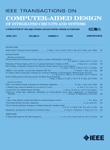
IEEE TRANSACTIONS ON COMPUTER-AIDED DESIGN OF INTEGRATED CIRCUITS AND SYSTEMS
Shaping the Future of Electronics through Design ExcellenceIEEE Transactions on Computer-Aided Design of Integrated Circuits and Systems, published by the IEEE - Institute of Electrical and Electronics Engineers, is a prestigious journal that serves as a pivotal resource in the fields of computer graphics, computer-aided design, and electrical engineering. With its ISSN 0278-0070 and E-ISSN 1937-4151, this journal covers innovative research and advancements in the design and development of integrated circuits and systems from 1982 to 2024. Recognized for its high impact, it ranks in the top quartiles (Q1) for both Computer Graphics and Computer-Aided Design, as well as Electrical and Electronic Engineering, reflecting its significance and influence in these domains. It also achieves a commendable Q2 ranking in Software, ensuring a comprehensive view of technology's intersections. Although not openly accessible, this journal remains an essential platform for researchers, professionals, and students, fostering the dissemination of breakthroughs and collaborative projects that shape the future of electronic system design.

REAL-TIME SYSTEMS
Transforming Insights into Real-Time InnovationsREAL-TIME SYSTEMS is a pivotal journal published by SPRINGER, specializing in the field of computer science and engineering with a focus on real-time systems and their applications. Since its inception in 1989, this journal has become an essential resource for researchers and professionals dedicated to advancing the understanding of real-time computing, control systems, and optimization techniques. With a notable Impact Factor reflective of its rigorous peer-review process, REAL-TIME SYSTEMS is positioned in the Q2 and Q3 categories across multiple relevant disciplines, including Electrical and Electronic Engineering and Computer Networks and Communications. The journal features a wide range of original research articles, case studies, and reviews, aiming to disseminate high-quality findings that fuel innovation and development in real-time systems. Though it operates under a conventional access model, the comprehensive insights it offers are invaluable for academics, industry professionals, and students alike, nurturing a deeper appreciation for the intricacies and evolving nature of real-time systems.
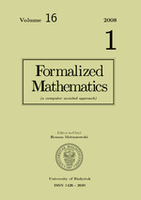
Formalized Mathematics
Pioneering Open Access in Formalized MathematicsFormalized Mathematics is a pioneering open-access journal published by SCIENDO, dedicated to the field of formalized systems and mathematical foundations. Since its inception in 2006, it has provided a platform for researchers to discuss and disseminate advancements in applied mathematics and computational mathematics, emphasizing formalization in mathematical reasoning. Although recent coverage in Scopus has been discontinued, the journal still serves as a valuable resource for academics looking to deepen their understanding of formalized approaches to mathematical problems. With its ISSN 1898-9934, the journal not only promotes unrestricted access to quality research but also facilitates collaboration among mathematicians and computer scientists. Given its rankings—20th percentile in Applied Mathematics and 18th percentile in Computational Mathematics—Formalized Mathematics is a vital conduit for innovative research, making it a significant asset for students, professionals, and scholars aiming to explore the intersection of mathematics and formal logic.
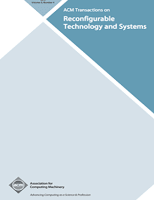
ACM Transactions on Reconfigurable Technology and Systems
Transforming Ideas into Reconfigurable RealitiesACM Transactions on Reconfigurable Technology and Systems is a leading journal in the field of computer science, specifically focusing on the rapidly evolving area of reconfigurable technology. Published by the esteemed Association for Computing Machinery, this journal provides a vital platform for researchers and practitioners to share groundbreaking findings and innovative methodologies that drive advancements in system design, architecture, and implementation. The journal boasts a commendable impact factor and has positioned itself within the top quartile (Q1) of computer science journals as of 2023, with a notable Scopus rank of #64 out of 232 in the General Computer Science category, placing it in the 72nd percentile. As a trusted resource for the latest developments from 2008 to 2024, the journal encourages submissions that challenge conventional approaches and propose novel solutions in reconfigurable technologies. Although it is not open access, it continues to strive for accessibility and dissemination of knowledge that is critical for academics, industry professionals, and students alike.
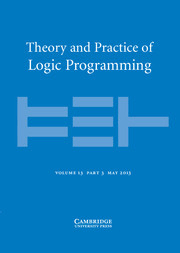
THEORY AND PRACTICE OF LOGIC PROGRAMMING
Elevating Research Standards in Logic Programming.THEORY AND PRACTICE OF LOGIC PROGRAMMING, published by Cambridge University Press, is a premier academic journal that delves into the evolving field of logic programming, offering insights and advancements from 2001 to 2024. With an ISSN of 1471-0684 and an E-ISSN of 1475-3081, this journal serves as a vital resource for researchers, professionals, and students interested in areas such as artificial intelligence, computational theory, and software development. In 2023, the journal was recognized for its excellence, achieving Q1 status in Computational Theory and Mathematics and Q2 in several other categories, underscoring its significant impact within the academic community. Despite not being open access, its robust content, curated by esteemed scholars, guarantees high-quality research and innovative methodologies that are crucial for advancing the field. The journal's rigorous peer-review process and its standings in Scopus rankings further emphasize its relevance and authority, making it a quintessential platform for disseminating key findings and fostering scholarly dialogue.

DESIGN AUTOMATION FOR EMBEDDED SYSTEMS
Shaping Tomorrow's Embedded Systems TodayDESIGN AUTOMATION FOR EMBEDDED SYSTEMS, published by Springer, is an esteemed journal focusing on the advancements in the design automation of embedded systems. With an ISSN of 0929-5585 and an E-ISSN of 1572-8080, this journal has made significant contributions to the fields of Hardware and Architecture and Software, as reflected in its Q3 ranking within the respective categories. Since its inception in 1996 and continuing through its ongoing publications until 2024, DESIGN AUTOMATION FOR EMBEDDED SYSTEMS provides a vital platform for researchers, professionals, and students to disseminate innovative research findings, methodologies, and technological developments. Although it does not currently offer open access options, its rigorous peer-review process ensures only the most impactful studies shape the future of embedded systems design. This journal is essential for anyone looking to stay at the forefront of research and development in embedded systems design and automation.

Logical Methods in Computer Science
Fostering groundbreaking research in logical methodologies.Logical Methods in Computer Science is a premier Open Access journal dedicated to fostering scholarly dialogue within the realms of Computer Science and Theoretical Computer Science. Established in 2004 and published by LOGICAL METHODS COMPUTER SCIENCE E V in Germany, this journal aims to bridge theoretical frameworks and practical applications, providing a platform for innovative research and discoveries. With an impressive HIndex reflecting its commitment to high-quality research, Logical Methods in Computer Science has achieved a Q2 ranking in both the miscellaneous and theoretical categories of computer science, indicating its growing influence in the academic community. Researchers, professionals, and students are encouraged to access and engage with the wealth of knowledge this journal offers, which is freely accessible to facilitate widespread dissemination of cutting-edge advancements in logical methods. With its convergence period extending from 2005 to 2024, Logical Methods in Computer Science continues to be a vital resource for those looking to explore the intersections of logic, computation, and mathematics.

International Journal on Software Tools for Technology Transfer
Exploring Cutting-Edge Tools for Effective Technology TransferInternational Journal on Software Tools for Technology Transfer (ISSN: 1433-2779; E-ISSN: 1433-2787), published by SPRINGER HEIDELBERG, stands as a pivotal platform for advancing the intersection of software engineering and technology transfer. Operating out of Germany, this esteemed journal has contributed significantly to the field since its inception in 1997 and continues to disseminate cutting-edge research through 2024. With a current impact footprint reflected in its Q2 status in Information Systems and Q3 in Software categories, it holds an impressive Scopus rank in the top 60th and 52nd percentiles respectively. Researchers, professionals, and students alike will find its commitment to exploring innovative software tools and techniques essential for enhancing technology transfer processes invaluable. Although the journal does not offer open access, its rigorously peer-reviewed articles are crucial for those seeking high-quality research insights.

FORMAL ASPECTS OF COMPUTING
Unveiling New Dimensions in Formal Aspects of ComputingFORMAL ASPECTS OF COMPUTING is a distinguished journal published by the ASSOCIATION FOR COMPUTING MACHINERY, dedicated to the fields of Software Engineering and Theoretical Computer Science. With the ISSN 0934-5043 and E-ISSN 1433-299X, this journal has made a significant impact in its categories, achieving a Q3 ranking in both Software and Theoretical Computer Science as of 2023. The journal spans over three decades since its inception in 1989, providing a platform for high-quality research that addresses critical formal methods and their applications in computing. While it currently does not offer open access, it remains an essential resource for researchers and practitioners in the field. The journal's credibility is bolstered by its Scopus rankings, placing it in the top half of both theoretical and software-related fields. By engaging with current trends and fostering innovative approaches, FORMAL ASPECTS OF COMPUTING stands as a vital repository of knowledge and a catalyst for future advancements in the discipline.
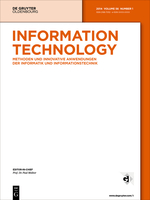
IT-Information Technology
Fostering Excellence in IT ScholarshipIT-Information Technology, published by WALTER DE GRUYTER GMBH, is a prestigious academic journal based in Germany that focuses on the multifaceted developments in the field of information technology. With an impressive Q2 ranking in Computer Science (Miscellaneous) and a Scopus ranking of #87 out of 232, this journal serves as a vital resource for researchers, professionals, and students interested in the latest advancements and research across various aspects of IT. Although currently operating under traditional access options, its rich repository of knowledge spans significant periods, notably from 1987 to 1988 and 1996 to 2024, making it essential reading for those seeking to deepen their understanding of computational innovations and methodologies. The journal's commitment to publishing high-quality research ensures that it remains a key player in shaping the discourse within the IT community.